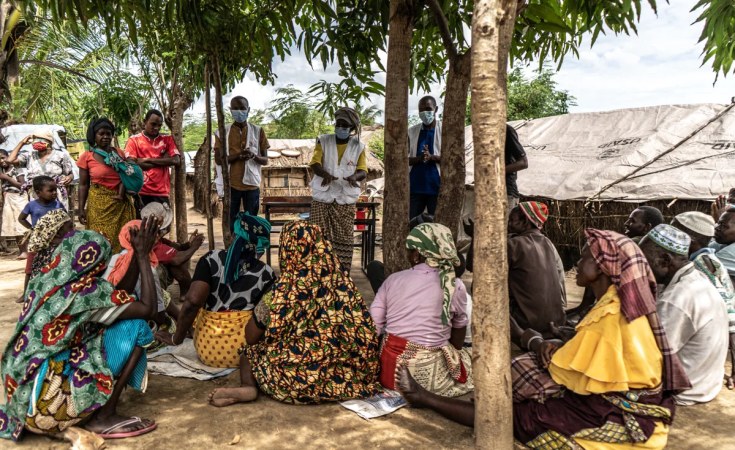Harare — In March 2021, rebels carried out an assault on the town of Palma in northern Mozambique that left scores of people dead, drove thousands from their homes, and postponed a sizeable gas project that was going to be built nearby.
Two years after the heinous incidents that garnered worldwide notice, MSF held an online roundtable conversation with some of their specialists as guest presenters under the title, Two years after Palma Attacks in Cabo Delgado - Mozambique.
Although the security situation in this town and the surrounding area has eased, the crisis in the northern Mozambican province of Cabo Delgado remains. While some people have returned to the area and are back to previously affected areas by the conflict, many others escape from locations that experience new violent incidents each month.
MSF has been working in Cabo Delgado since 2019 to provide community-based services, mobile clinics, assistance for local hospitals, and access to healthcare for people who have been displaced or are returning due to the violence. Federica Nogarotto, Country Representative of MSF in Mozambique, says the conflict which began in the northernmost province of Cabo Delgado in 2017, has forced close to a million people to become internally displaced.
"As of November 2022, we are speaking about over 1 million displaced people in a location that is not a big location. So what we have to understand is that those people are moving and then moving again, Because they are fleeing from violence, but the location where they were thinking that they were safe, there is another attack, and then they have to move again," Nogarotto said.
The armed conflict has limited communities' access to health care in Cabo Delgado, forcing families to walk long distances and then sit on the ground for a long time while waiting to be seen. Meanwhile, women have not had enough room for giving birth.
"So they don't have any more access to all basic needs, including medical assistance, and healthcare, which is what we provide. Some cannot get the treatment of malaria, or women that don't have access to antenatal care. They sometimes deliver without any kind of assistance in the middle of the bush," she said.
Philip Aruna, Regional Support Team leader of MSF for Southern Africa, says security has improved in Palma.
"Two years ago, people were fleeing for their lives, many loved ones were killed. And today we are talking about people going back. I saw lots of people going back to Palma so meaning the situation, seems to be improving," he said.
However, there are significant gaps and challenges that we have to address including health services within the district, particularly in areas outside of a town.
"Health Services have resumed at the district hospital, which makes it the only functional health facility within the district and with a population of about 70,000 people," Aruna said.
Aruna and the MSF team began activities in the district when displaced people started to gradually return. Most of the people who fled are coming back to Palma where MSF is running Primary Healthcare mobile clinics in four locations. Since then, they have been supporting mobile clinics including Palma hospital where they provide specialist medical care. The team, according to Aruna, is planning another mobile clinic in another health center which is a bit on the western part of the district, where people have gradually started to return.
Just in 2022 MSF team conducted more than 33,000 Primary Healthcare consultations, featured more than 8,500 patients for malaria, provided health promotion activities for over 3000 people and provided sexual reproductive health care to more than 4500 women.
Even with the positive changes, Cabo Delgado's problems are far from being resolved. This is according to Helena Cardellach, Emergency Coordinator of MSF in Cabo Delgado.
"The reality is that humanitarian assistance has been disproportionately deployed in the province, particularly in the areas where MSF is working - that is the - hard-to-reach areas," said Cardellach.
MSF is also providing medical and mental health care.
"It's key now in this kind of situation. With people being traumatized, and having experienced some traumatic situations. We're doing also some health promotion activities and delivering relief items, with many materials for these people that are living in difficult conditions," she said, urging other organisations to mobilize funds and help out.
"The situation is quite volatile and needs are there, as I was saying, and it's really important that other actors and other organizations can reach those areas where a lot of people are in need. We know that it's been complicated for for some organizations to get funds, but we think that funds have to be mobilized," she added.
A region with abundant resources available, Cabo Delgadoo is a province rich in natural gas reserves that have attracted an estimated $60 billion in foreign investment. The death and destruction has spread across to other provinces, including Nampula. In 2020, the conflict escalated and in 2022, the country began developing its first counter-terrorism Resilience and Development Strategy for the North - which at the time was expected to be funded by donors to the tune of hundreds of millions of U.S. dollars.
The most recent government move has seen the approval of militias to assist the government, SADC and Rwandan forces to fight insurgents who are causing instability in the north and elsewhere in the country.


